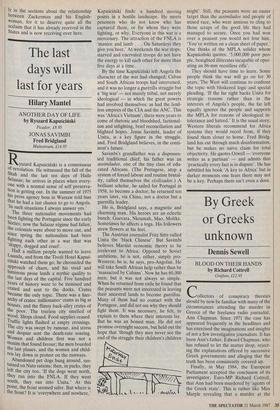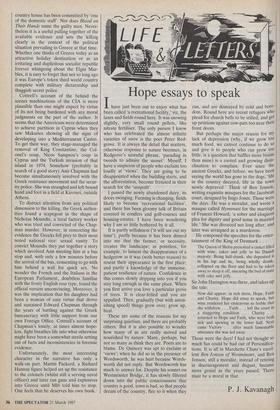By Greek or Greeks unknown
Dennis Sewell
BLOOD ON THEIR HANDS by Richard Cottrell
Grafton, L12.95
Collectors of conspiracy theories should by now be familiar with many of the circumstances attending the murder in Greece of the freelance radio journalist, Ann Chapman. Since 1971 the case has appeared frequently in the headlines and has exercised the imaginations and insights of not a few investigative journalists. It has been Ann's father, Edward Chapman, who has refused to let the matter drop, reject- ing the explanations offered by successive Greek governments and alleging that the truth has been consistently covered up.
Finally, in May 1984, the European Parliament accepted the conclusion of its investigator, Euro-MP Richard Cottrell, that Ann had been murdered by 'agents of the Greek state'. This is rather like Miss Marple revealing that a murder at the country house has been committed by 'one of the domestic staff. Nor does Blood on Their Hands name the guilty men. Never- theless it is a useful pulling together of the available evidence and sets the killing clearly in the context of the political situation prevailing in Greece at that time. Whether one thinks of Greece today as an attractive holiday destination or as an irritating and duplicitous socialist republic forever whingeing about the Elgin Mar- bles, it is easy to forget that not so long ago it was Europe's token third world country complete with military dictatorship and thuggish secret police.
Cottrell's account of the behind the scenes machinations of the CIA is more plausible than one might expect by virtue of its not being burdened with any moral judgments on the part of the author. It seems that the Americans were determined to achieve partition in Cyprus when they saw Makarios showing all the signs of developing into a Mediterranean Castro. To get their way, they stage-managed the removal of King Constantine, the Col- onel's coup, Nicos Sampson's coup in Cyprus and the Turkish invasion of that island in 1974. Somehow (probably in search of a good story) Ann Chapman had become simultaneously involved with the Greek resistance movement and the secur- ity police. She was strangled and left bound hand and foot in a field at Kavouri, outside Athens.
To distract attention from any political dimension to the killing, the Greek author- ities found a scapegoat in the shape of Nicholas Moundis, a local factory worker who was tried and convicted of the Chap- man murder. However, in concocting the evidence the Greeks fell prey to their most noted national vice: sexual vanity. To convict Moundis they put together a story which involved Ann meeting him at a bus stop and, with only a few minutes before the arrival of the bus, consenting to go with him behind a wall for quick sex. No wonder the French and the Italians in the European Parliament, doubtless familiar with the frosty English rose type, found the official version unconvincing. Moreover, it was the implication that his daughter had been a woman of easy virtue that drove and sustained Edward Chapman through the years of battling against the Greek bureaucracy with little support from our own Foreign Office. Cottrell's account of Chapman's lonely, at times almost hope- less, fight breathes life into what otherwise might have been a somewhat sterile setting out of facts and inconsistencies in forensic evidence.
Unfortunately, the most interesting character in the narrative has only a walk-on part. Martin Packard, a Richard Hannay figure helped set up the resistance to the colonels (whilst still a serving naval officer) and later ran guns and explosives into Greece until MI6 told him to stop. One feels that he deserves his own book.



















































 Previous page
Previous page